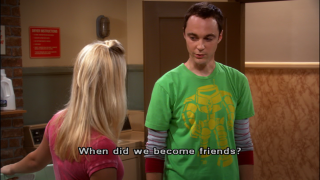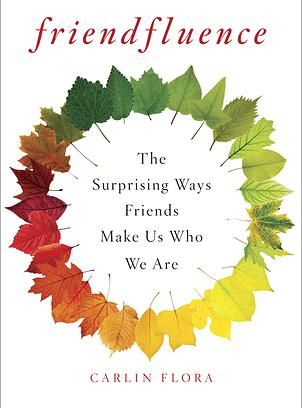Friends
Figuring Out Friendship
How an adult on the autism spectrum experiences friendship.
Posted December 31, 2014

Over the past few months, I’ve been thinking a lot about friendship. What I understand about it, what I still don’t, and how the experience of friendship has always been different that it has been for others.
When I was young, my understanding of friendship was very simple. If I liked someone, and they were kind to me, they were my friend. It did not occur to me that being friendly was not the same as being a friend. Being bullied changed that quickly.
In the interim, my model of friendship has changed quite a bit. I know recognize quite a few gradients of friendship...but I know that my model of friendship is much more simple than most I know. Just the prospect of keeping up a large network of multi-tiered friendships sounds exhausting to me beyond all compare.
There have been times in my life when I felt that just maintaining one good friendship was all I could manage. As rewarding as it was, friendship was hard work. But, in recent years I’ve noticed that this has been changing.
As my awareness of autism has grown, socializing has become easier. I’m not sure precisely all the reasons for that, but I believe having an understanding of AS and NT differences plays its part, as well as the resulting ability to adjust my communication to fit those differences. Being more open about my challenges has also had its role to play.
Lately, I’ve been noticing an odd pattern. One that, at first, troubled me. I am finding that more and more over the past few years, people seek me out to socialize. They drop by my cube to chat, single me out for conversation. I’ve watched this with a certain amount of awe.
More than a few times, after such an encounter, I’d catch myself thinking, “Wow...these people seek to really like me!” I’d bask in the wonder of that thought for a moment, until another thought would come in: “Why?” When I recognized this thought, it broke my heart a little. Did I really think so little of myself?
But, as I further thought about it, I realized that it wasn’t about that. The question was a social one, and a logical one, in the circumstances. I’ve experienced a lot of rejection over the years. I don’t really feel like I’m any different as a person than I was on those days. So, why should people seem to like me now, when they didn’t before? It’s a social conundrum.
Figuring this out led me to another realization. One of the ways that my model of friendship varies from that followed by most NT folks is that I must operate within it, in most cases, without an absolute knowledge of the other person’s feelings toward me. I have developed means, logical and otherwise, to weed out those who smile to my face, but mean ill in their heart — but I struggle with the more subtle differences of feeling.
If I’m lucky, the other person will identify me explicitly as their friend, introducing to others as their friend, or referring to me as “my friend Lynne.” The first time it happens, it almost always comes as a surprise. In that moment, I have to suppress my surprise.

Inevitably, that moment of surprise will bring with it a question I know that I can never ask: “When did we become friends?” It’s one of those questions that’s social dynamite, one that can in many cases, destroy a relationship before it has begun. I understand in theory why that is, but in the end it isn’t helpful for someone like me. How do learn about how a process works and what you did right, if you can’t ask questions about how it happened?
On the other side, there are those who’ve never used the word “friend,” but who’ve behaved as a friend. I trust these people more than the people use the words, at least those who’ve used the words alone. Actions speak louder than words, after all. But, because we don’t talk about the nature of our relationship, I am never sure. Are they aware of the impact of their actions on me? Do they see their actions as actions of friendship, or as kindnesses toward a colleague? I don’t know.
All this has made things difficult for me in the wake of the death of a good friend a few weeks ago. My friend was one of very few people who never kept me in suspense. She was direct and honest, and forthright about how she felt. This is part of what made us so close. There was a safety there that I rarely get.
She was one of the first people I could truly be open with about my social struggles, and she took it in stride without batting an eye. She was one of a very few people who took my own descriptions of my own experiences and challenges at face value, and didn’t project her own perceptions onto it. She was my sounding board, and my coach in a number of situations.
In many ways, she was closer to me than family, which a number of people didn’t really “get.” For me, friendships are few but deep. What you have to work hard for, you value deeply. Whereas many of my more social friends and acquaintances seem to have friendships that are more numerous, but more narrow and on the surface.

Even when there aren’t autistic differences in play, friends tend to get the short shrift when it comes to grieving. In Carlin Flora’s book, Friendfluence, Professor Brian De Vries of San Francisco State University calls friends “disenfranchised grievers.” He goes on to say, “No one ever sends friends condolences or flowers. No boss would give you a week off if your friend died. No airline would give you a compassion fare to travel to a friend’s funeral. Only the family is entitled to grieve.”
Further on in the book, Ms. Flora wrote: “Often, mourning a friend is just as painful as mourning a relative, yet the lack of formal support for these grievers can make it harder for them to cope.” This has been very true for me. I’ve had people say things to me in the past few weeks that they would never say to someone grieving a family member. But somehow, this was deemed OK, because she was “just a friend.” Pair this “friendship gap” with the the complications I talked about in my last post, and the journey has been a rough one.
In her post “Autistic Grief is Not Like Neurotypical Grief,” Karla Fisher talked about how the lack of understanding of how adults on the spectrum view relationships proved to be a barrier to her in her process of working through grief with a therapist. She wrote:
“Again, my understanding of relationships is very different from my NT counterparts. This misunderstanding of views caused my therapist and me to stumble quite a bit. He tried to explain to me about how humans relate and how friendships happen, etc., and I knew that none of that stuff applied to me. It was frustrating for us both. My models of these things were very different from what he was showing. In fact, my relationship model is very, very simple. You are either a friend or not a friend. If you are a friend, you get me 100% as I am. Had my therapist understood my views on relationships and how my father fit into that view, he could have offered me a lot better advice or at least not confused me with his models.”
There are some differences between Karla’s relationship model, and mine — but they are more alike than what I’ve seen with neurotypical folks in my life. I think these differences need to be understood better. As evidenced by Karla’s experience, the lack of understanding of these differences can be a real barrier for those attempting to help someone on the spectrum who is struggling. I think this is true not only of grieving, but any time a person on the spectrum seeks help.
Overall, the best description I’ve heard of the experience of dealing with friendship when you’re on the spectrum came from Gavin Bollard on his blog Life With Aspergers. He wrote:
“Having friends when you have Asperger's syndrome is like walking around in the dark and not knowing whether the next thing you bump into is going to be hard or soft - or whether it is going to shatter into a thousand pieces.”
Sounds about right.
For updates you can follow me on Facebook or Twitter. Feedback? E-mail me.
My book, Living Independently on the Autism Spectrum, is currently available at most major retailers, including Books-A-Million, Chapters/Indigo (Canada), Barnes and Noble, and Amazon.




